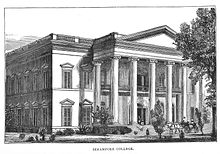Bible translations into Bengali


Nathaniel B. Halhead of the East India Company published a Bengali grammar for British officials in 1776 to aid interaction with the local Bengali population.[1] William Carey of Serampore translated the Bible into the Bengali language and published it in 1793 and 1801.[2][3] The high language Bengali translation in use in Bangladesh is derived from Carey's version, while "common language" versions are newer translations.[4] Fr. Christian Mignon, a Belgian Jesuit, finished a revised version of the Bible in Bengali, named Mangalbarta, which has copious footnotes.[5] Missionaries have also translated the Bible into "Musalmani Bangla", as well as the Chittagonian and Sylheti dialects.[citation needed]
Christian Bengali
William Carey's translation of the Bible into Bengali was peculiar to mainstream Bengali. It came to be known as "Christian Bengali" and intelligibility of this new dialect was somewhat restricted to educated Bengali Christians.[6] The Bengali converts to Christianity during the British rule were mainly Upper Caste Hindus and this translation of the Bible to "Christian Bengali" was prohibited to be revised in fear of Sanskritisation and subsequent Hinduisation of the converts.[7] The dialect has become the language of Christian worship and Bengali Christian literature, but restricted to this small community; and therefore not allowing non-Christian Bengalis to understand.[8] It is said to have been influenced by the works of the earlier Portuguese missionaries in Bengal who also established a Christianised Bengali dialect which lasted for roughly 150 years, before the establishment of Fort William College and rise of Anglo-Christian Bengali.[9] The Portuguese settlers also inspired the use of a Portuguese dialect, known as Bengali Portuguese creole, which is no longer intact.
Versions
- Pobitro Baibel The Bible in Bengali (Holy Bible) (SBCL) : Copyright Bible Society of Bangladesh 2001 Formerly called Re-edit Cary Version. Text version Audio of New Testament (Select Bengali, then Re-edit Bangla Version) Mobile Apps
- Kitabul Mukkadas (MCBI) : Copyright Bible Society of Bangladesh 1980 Audio (Select Bengali, then Mussalmani Version) Android
- Easy to Read Version (ERV) : Copyright WBTC India 2006 Audio (Select Bengali, then Easy-to-Read Version) Mobile Apps
- Common Language translation of the Bengali Bible : Copyright The Bible Society of India 1999
- Jubilee Bible : Copyright Catholic Bishops' Conference of Bangladesh, 2000
- The Holy Bible in Bengali : containing the Old and New Testaments, Calcutta, published by the British and Foreign Bible Society (Calcutta Auxiliary) in 1909: in public domain
References
- ^ Representing India: literatures, politics, and identities Mukesh Williams, Rohit Wanchoo - 2008 "Nathaniel B. Halhead published the Bengali Grammar in 1776 to aid British officers of the East India Company to converse with the local Bengali population. British orientalist William Carey (1761-1834), who was a professor of Sanskrit ..."
- ^ Das, Sisir Kumar (1966). Early Bengali prose, Carey to Vidyāsāgar. pp. 67–68.
- ^ Alexander P. Varghese India : History, Religion, Vision And Contribution To The World Page 662 2008 "William Carey, a Baptist evangelist who settled down in Serampore, translated the Bible into Bengali and published it in 1793. Later, Carey and his associates translated the Bible into thirty Indian languages."
- ^ In search of Jesus: insider and outsider images - Page 56 Clinton Bennett - 2001 "Similarly, in Bangladesh, the high Bengali translation derived from the efforts of the pioneer Baptist missionary, William Carey, remains for most Bangladeshi Christians the Bible, and more modern, 'common language' translations are looked on with suspicion."
- ^ Chattopadhyay, Subhasis (November 13, 2017). "Fr. Mignon: An Unsung Hero of the Bengali Bible". Indian Catholic Matters. Archived from the original on 31 May 2018. Retrieved 18 January 2018.
- ^ The Bible Translator, Volume 18. United Bible Societies. 1967. p. 59.
- ^ Dil, Afia (1993). Two Traditions of the Bengali Language. National Institute of Historical and Cultural Research. pp. 47–48.
- ^ Dil, Afia (1993). The Hindu and Muslim Dialects of Bengali. Committee on Linguistics, Stanford University. pp. 18–19.
- ^ Khondkar, Abdur Rahim (1976). The Portuguese Contribution to Bengali Prose, Grammar and Lexicography. Bangla Academy. p. 37.
